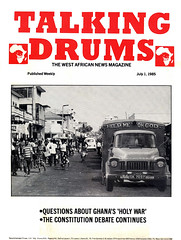Comment
Pounds, Shillings And Pence
It is possible that it has been naivety on the part of those who believed that there were considerations other than commercial in the relationship of western countries with African countries in both pre and post independence times.
Once in a while, however, some rumblings seem to indicate that those grand old "British values" have neither been forgotten nor were they meant to hoodwink the innocent in the first place.
'The Observer’, the London Sunday newspaper at the weekend wrote an editorial which illustrates the point and we quote it here in its entirety:
"This is the moment for the British Government to put right its dismal record of pusillanimity over human rights abuses in Uganda. The newly released Amnesty International report, with detailed evidence by two British surgeons of high standing, calls for clear condemnation of the atrocities being committed under President Milton Obote's regime.
Public opinion in this country has been shocked by the report, but the Minister of State at the Foreign Office, Malcolm Rifkind, reacted with deplorable suavity and evasiveness. It will not do. Britain is now the only member of the Commonwealth still willing to keep a military training mission in so bloodstained a country. Of course, the North Koreans are also instructing the Ugandan army; but their reputation for brutality gives little hope for improved treatment of innocent civilians.
As the former colonial power, at the heart of the Commonwealth, we have a particular duty. Sir Geoffrey Howe should tell Dr Obote that it is impossible any longer to turn a blind eye to so much evidence of torture, rape and murder. This message must not be diluted for mere commercial considerations.
Unless Kampala offers an acceptable response, including a readiness to punish the known perpetrators of these atrocities, Britain should pull out its military mission and cancel all aid. Dr Obote should also be told that without a halt to the persecution of his political opponents, the elections he plans for later this year will be dismissed as a travesty. One Opposition MP has recently been abducted and murdered, two more are in detention, and dozens of party officials have been liquidated. Tens of thousands of 'uncooperative' villagers have been killed.
Britain has to speak out. Otherwise it will be in danger of guilt by association." The effect was almost instantaneous. Mr Malcolm Rifkind the Minister of State at the Foreign Office has since then made the strongest noises yet about Uganda and has actually intimated that the stories of atrocities being committed under President Obote's regime might be true.
Not too long ago, Mr Rifkind was pooh-poohing all such stories. The tragedy is that much of the rest of the world the western half of it at least take their cue in these matters from Britain precisely because she is the former colonial power and at the heart of the Commonwealth. And in spite of all protestations to the contrary, British endorsement and cooperation give comfort to every oppressive regime in Africa. One only has to take note the number of times and how very enthusiastically even the most "revolutionary" of such regimes publicise the merest hint of praise or endorsement from a British official.
It is instructive to realise just how very important "commercial considerations" influence the formulation of policy and how backward a seat the much vaunted "British values" take when the crunch is actually on.
It is instructive to read from the British press the number of times reference is made to the trade figures with a particular country in discussing subjects that to the uninitiated have absolutely nothing to do with trade
It is instructive to realise that "commercial considerations" shape the thinking of any foreign issue and dominate the decision making. Obviously those that seize power forcibly in Africa and elsewhere know this and are well aware that the "British values" are translated into pounds, shillings and pence, decimalisation and all.
The ranks of the naive keep diminishing and the time might yet come when there will be no need for the camouflage.
Even such comments as from 'The Observer' can hardly restore any faith. For, to qualify as a case worth noticing in Africa for atrocities, you have to reach the Idi Amin league or the present state in Uganda. "There has to be a pattern," is the term often employed, random killings do not count, and most important, for as long as the leader of the country routinely condemns the random brutalities, you can get the good housekeeping seal. Thus some of the leaders have perfected the art of saying enough to keep within the requirements and qualify for British aid and trade. And while random brutalities are allowed in African countries and draw no ire from the Foreign Office, the murder of one Polish priest obviously falls in the "pattern" category.
If things have to get as bad as Uganda now before commercial considerations can be discarded, if ever, may it not be better to do away with all the pretensions!
As everybody is learning, the market rules OK, and we shall all put the proper value on all these "values" in pounds, shillings and pence
